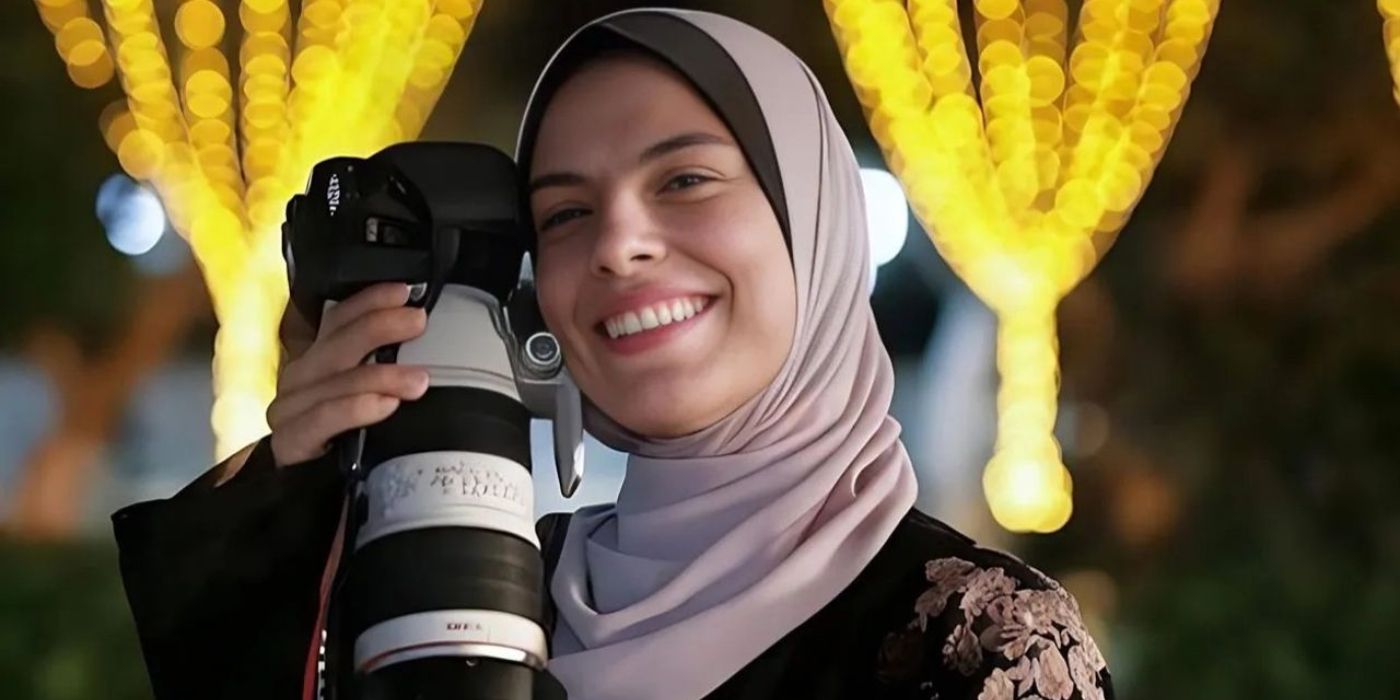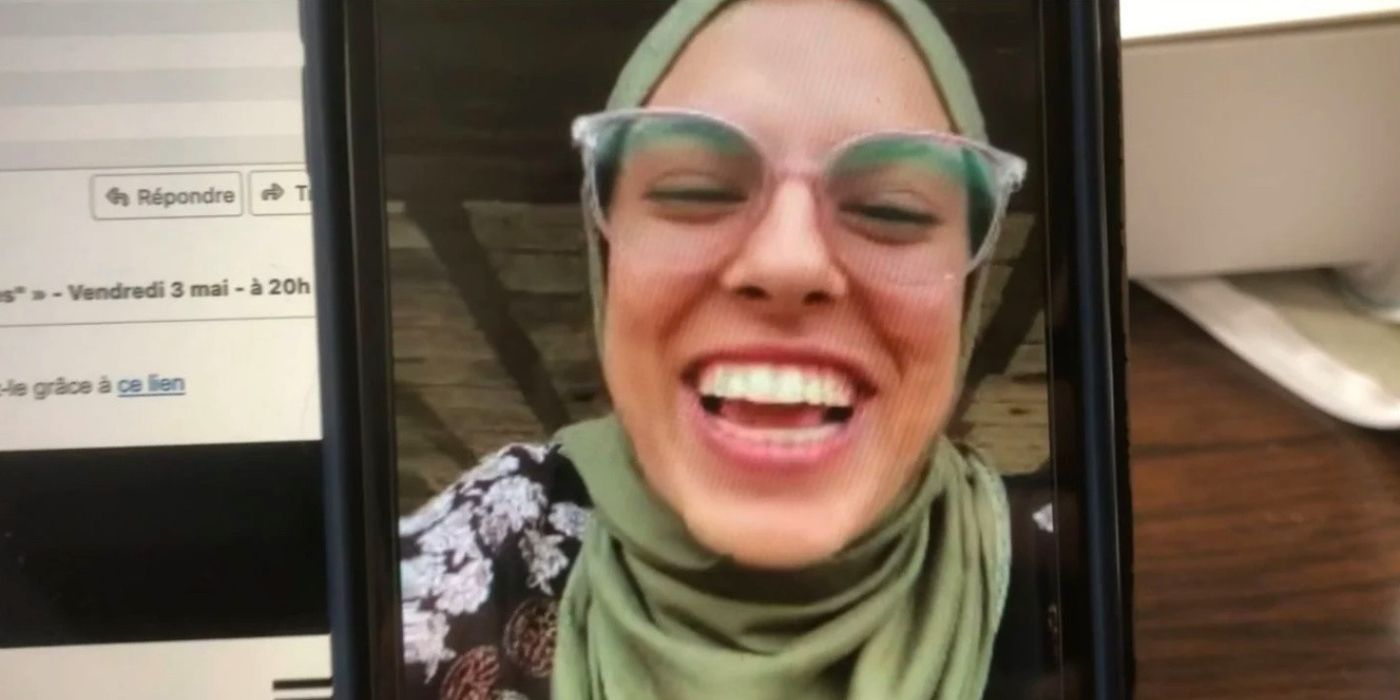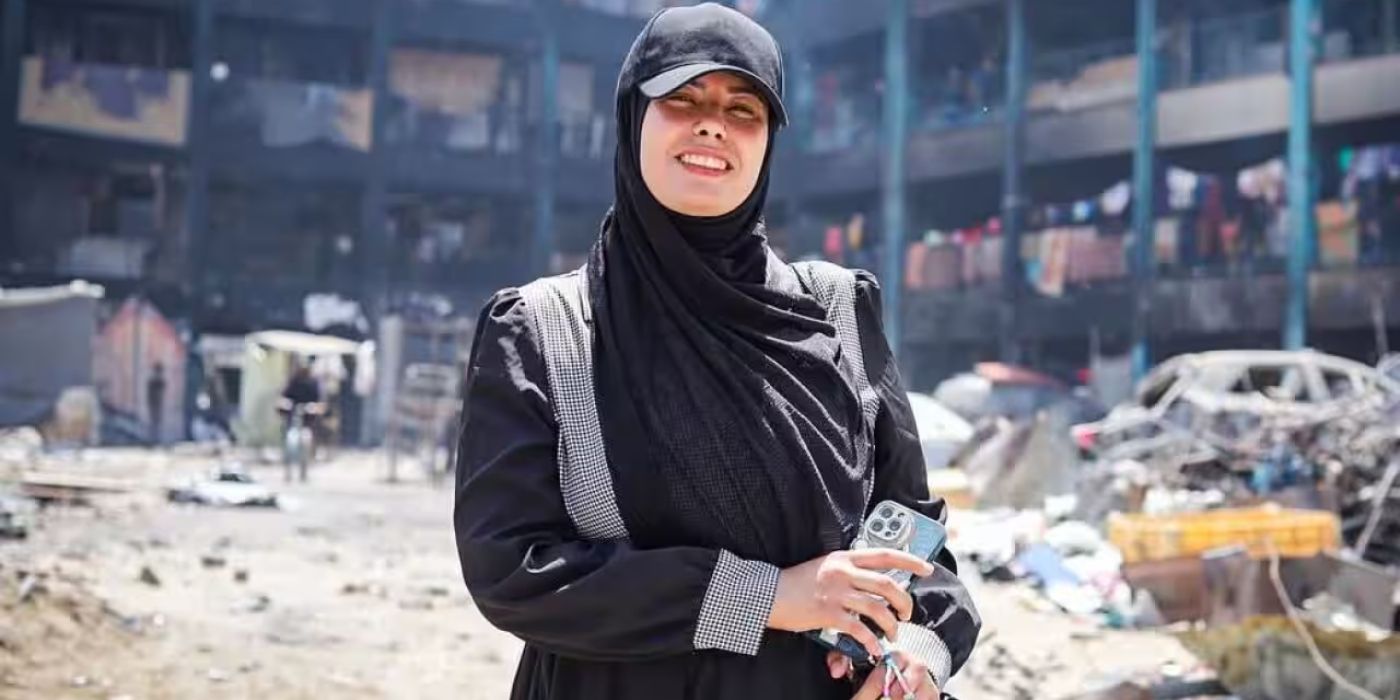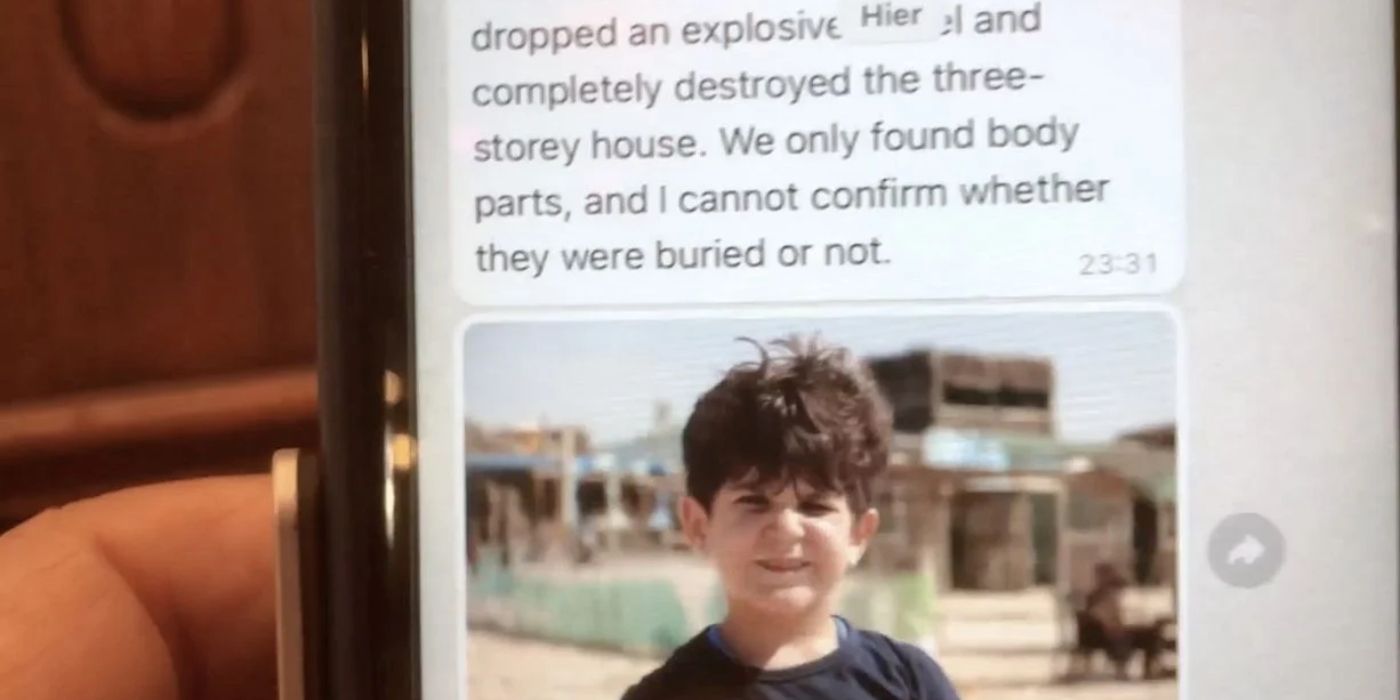
Although these journalists, media workers, aid workers, and health workers are safeguarded by international law, it’s alarming to note that at least 175 of them have been killed by Israeli Occupying Forces (IOF or IDF) since October 7, 2023, following a Hamas attack that claimed over 1,200 lives in Israel. This tragic count also includes more than 400 aid workers and over 1,300 health workers in Gaza, as highlighted by the discovery of a mass grave holding 15 paramedics and rescue workers who were brutally murdered. The 25-year-old photojournalist Fatima Hassouna, featured in the recently produced documentary film titled Put Your Soul On Your Hand and Walk, is the most recent casualty; she and nine members of her family were tragically killed just 24 hours after learning that her film would be showcased at the ACID section of the Cannes Film Festival.
Due to an attack by the Israeli military, Hassouna and her family unfortunately became victims, joining the vast number of civilians who have lost their lives since October 7. At present, it is difficult to determine the exact number of fatalities, primarily because Israel restricts access to Gaza and poses threats and risks to journalists, some of whom have even been killed. The reported death toll among Palestinians stands at approximately 52,000, but experts estimate that over 100,000 people may have perished. Moreover, nearly the entire region has been reduced to ruins as a result of relentless bombing. In their article covering Hassouna’s demise, The Times of Israel – often labeled as an Israeli military propaganda outlet – stated:
The Israeli Defense Forces (IDF) report that the operation aimed at a Hamas operative who was responsible for assaults on both military personnel and civilian populations. Before executing the strike, efforts were made to lessen potential harm to civilians, such as employing precision-guided munitions, conducting aerial surveillance, and utilizing additional intelligence.
Film director Sepideh Farsi, whose movie revolves around Hassouna, her artistry, and their discussions, received the shocking news while in dialogue with the French Embassy about inviting Hassouna to Cannes for the premiere of their film. “She was radiant, incredibly gifted,” Farsi said to Deadline. “Once you see the movie, it will become clear.” Farsi had chatted with her just a few hours prior to inform her about the film’s acceptance in Cannes and extend an invitation. However, Hassouna wished to attend the screening but longed to return to Gaza; despite the perils and sorrow, it was her homeland.
She walked across / But I didn’t join her / Death took her instead / A deadly sniper bullet / She transformed into an angel / For a massive city / Larger than any dream I’ve ever had / Bigger than this very city / She became a work of poetry… – In the poem “The Man Who Wore Her Eyes” by Fatima Hassouna.
Farsi continued:
She told me that she would join us, but she needed to return to Gaza as it was where she didn’t want to leave. I had already contacted the French Embassy, initiating the process when we suddenly became concerned about her safe exit and re-entry. I felt uneasy about possibly separating her from her family. Now, tragically, the entire family is no more. Although I am still trying to confirm if Fatima’s parents are among the deceased, it is certain that Fatima, along with her sisters, brothers, and one of her pregnant sisters, have perished. Two days ago, during a video call, she had shown me her baby bump, which only makes this situation all the more heartbreaking.
ACID & Cannes Will Continue to Screen ‘Put Your Soul on Your Hand and Walk’
\nFatima Hassouna”‘ data-img-url=”https://static1.moviewebimages.com/wordpress/wp-content/uploads/2025/04/fatima-hassouna-on-a-phone-learning-that-the-film-put-your-soul-on-your-hands-and-walk-was-accepted.jpg” data-modal-container-id=”single-image-modal-container” data-modal-id=”single-image-modal” style=”padding-bottom:50%”>

Journalists and artists are often illumining issues that these organizations such as Amnesty International, the United Nations, Human Rights Watch, and others have labeled as Israel’s alleged crimes against humanity towards Palestinians, which can make them vulnerable to actions by the IOF. For instance, many believe Hassouna was intentionally targeted due to her work, similar to what happened recently with Palestinian filmmaker Hamdan Ballal, one of the directors behind the Academy Award-winning documentary “No Other Land.” Israeli settlers assaulted him before the Israeli police detained him without any legal justification.
She expressed her confusion and feelings of guilt, saying, “I attempted to give voice and emphasis, but now I’m uncertain… Perhaps they attacked her because the film was announced. I can’t be sure. We may never know.” She added, “The Israeli army claimed it bombed the house due to a Hamas officer inside, which is completely untrue. I am well acquainted with the entire family; it’s absurd. It’s just so heart-wrenching.” The ACID statement on social media read: “We condemn the bombing of the house, as the claim that a Hamas officer was there is false.
While exploring Sepideh Farsi’s film Put Your Soul on Your Hand and Walk during the Cannes programming, my team and I came across Fatima Hassouna. Her smile was enchanting, mirroring her determination: she testified, photographed, distributed food amidst bombs, mourned, and endured hunger. Her story resonated with us, we celebrated each glimpse of her wisdom, and worried for her safety. Tragically, we learned yesterday that an Israeli missile struck her building, claiming the lives of Fatima and her family.
In our upcoming movie, the vibrant spirit of this young woman shines brilliantly on screen. This isn’t the same film we initially planned; it will now be distributed, promoted, and premiered in cinemas, starting with Cannes. It’s essential that everyone involved in its creation – filmmakers and viewers alike – live up to her radiance.
Who Was Fatima Hassouna?
Film Director Sepideh Farsi penned a heartfelt homage to the photojournalist featured in her documentary, Fatima Hassouna, affectionately known as “The Eyes of Gaza,” for Liberation. Here’s the full text in English:
Fatima Hassouna: The Eyes of Gaza
By Sepideh Farsi
When I first met Fatima Hassouna, she was holding a camera and standing at the heart of a demonstration. She had the eyes of a storyteller and the spirit of a warrior. Her gaze was both fierce and tender, capturing the raw emotion of Palestine’s struggle in an instant.
Fatima wasn’t just a photographer; she was a symbol of resilience, a beacon of hope amidst the chaos. She captured the pain and the joy, the fear and the courage, with unparalleled honesty and sensitivity. Her images were windows into a world that many had never seen or dared to imagine.
Fatima Hassouna was more than a photojournalist; she was a voice for the voiceless, a face for the faceless. She was a reminder of the humanity in a conflict often reduced to statistics and headlines. Her work was a testament to the power of art in documenting history and inspiring change.
I am honored to have known Fatima Hassouna. I am humbled by her courage and inspired by her commitment. I am saddened by her loss, but I am grateful for the legacy she left behind. Her images will continue to tell the story of Palestine, a story of hope and resilience, a story that needs to be heard.
Rest in power, Fatima Hassouna. May your eyes continue to see, may your lens continue to capture, and may your spirit continue to inspire.
Sepideh Farsi wrote a tribute for a photojournalist named Fatima Hassouna who she made a film about called “The Eyes of Gaza.” She describes Fatima as a storyteller and warrior, capturing the raw emotions of Palestine’s struggle. Fatima was more than just a photographer; she was a symbol of resilience, a voice for the voiceless, and a reminder of humanity in a conflict often reduced to statistics. Her work was a testament to the power of art in documenting history and inspiring change. Sepideh is sad about Fatima’s death but grateful for her legacy. She hopes Fatima’s images will continue telling Palestine’s story, one of hope and resilience.
* I don’t have a resume, no formal record of my achievements or skills.
* To perceive two eyes is easy, but understanding them can be elusive.
* There are some things that remain shrouded in mystery.
* I suspect that I lack a compelling narrative, one that would resonate with strangers.
* It’s hard for others to believe my story, and they have their doubts.
* I am not physically distinctive, nothing about me stands out.
* I dream of defying gravity and flying freely through the skies.
* I suspect that I may be nearing the end of my life, perhaps even before I realize it.
* The person in front of me is armed with a sniper rifle, ready to pull the trigger at any moment.
* And then it will all come to an abrupt end, and I’ll be gone, silenced forever.
This poem is by Fatima Hassouna, often called Fatem by her friends, titled “The Man Who Wore Her Eyes.” The poem carries an aroma of sulfur, a hint of death, yet it pulses with life – just like Fatem did until the fateful morning of April 16. On that day, an Israeli bomb struck, taking not only Fatima but her entire family, leaving behind nothing but dust where their home once stood.
She had recently celebrated her 25th birthday. It was by mere coincidence that I crossed paths with her during a lecture given by a Palestinian friend in Cairo, at a time when I was desperately searching for a means to reach Gaza, as various roads were blocked. I was seeking an answer to a question that was both straightforward and intricate: How do you manage? How do you survive amidst bombings? Fresh off the release of my film titled “The Mermaid“, which bore a faint echo of the shockwaves from the Iraq-Iran war, I yearned to understand what life was like for Gazans. A truth that eluded me through conventional news sources and media. I longed to witness it firsthand. However, my French nationality, born in Iran, presented obstacles as both the Egyptian authorities and Israeli occupation made it difficult for me to travel.

During that one-year span, Fatem served as my eyes in Gaza, while I offered her a glimpse into the wider world, through our mutually beneficial interactions.
“What’s it like to be Palestinian?”
“I’m proud of it… Whatever they do, they will not be able to defeat us.
“They won’t be able to defeat you? Do you believe it? Why?”
“Yes. Because we have nothing to lose.”
As a dedicated film enthusiast, I found myself establishing a unique bond with Fatem this year. Every day, our conversations would culminate in me sending her a message before drifting off to sleep. In the stillness of the night, I’d find myself waking up, eagerly checking my phone to see if she had responded. The reassurance of those double ticks on my messages brought a sense of comfort, knowing that at least she had read them.
Currently, upon learning the recent news, my initial reaction was disbelief, assuming it was an error similar to a tragic incident involving a family with the same name, which occurred in an Israeli attack several months ago. Daily, I ponder over the Palestinians residing outside Gaza, torn away from their loved ones, and struggling to endure such profound pain. Frequently, fear grips me at the thought of her being taken by a bomb blast. Regrettably, I couldn’t fathom an explanation for this fear. I convinced myself that I had no reason to be afraid for her if she wasn’t. Instead, I drew solace from her fortitude and radiant smile.
Initially, I harbored strong doubts when the truce was declared in December. Yet, I thought it wasn’t fair to be untrusting if the Palestinians and Fatem were hopeful about it. I held my peace. Our conversations persisted, but they were fraught with more technical issues than before the truce, making video calls increasingly complex, if not impractical.

However, those memories of our chats, along with her photographs – so impactful, capturing both life’s brightest moments and the stark reality of Gaza under her compassionate yet firm gaze – remained deeply etched within me. Incredibly, I managed to reach out to her just two days ago, and she picked up. I was eager to share with her that our film had been chosen by ACID for screening at Cannes.
“Do you know the Cannes Film Festival?”
“Yes,” she said with a big smile. “But where is Cannes again?”
“Aren’t you afraid sometimes?”
“Afraid of what?”
“That the film puts you in danger?”
“No. And then, you know… Nothing is eternal on this earth. Even this war. It will eventually end.
“Yes, it will end in the end.” But after how many deaths?
In my own words, she shared a smile with me, one that I hold dear as the final memory I carry of her. Today, I find solace in that. And when I asked for her feelings about capturing the aftermath of a massacre through photography, she said, “I wish to reveal these images of our genocide, so that people may grasp the ordeal we endured.
In a social media post, Hassouna once expressed a desire for a memorable demise, rather than just being a headline or a statistic. She longed for a death that would echo through the years, leaving an indelible mark on time and producing an iconic image that wouldn’t be erased by the passage of time or location. Despite her passing, let us ensure Hassouna’s name is not forgotten.
1. Check out Fatima Hassouna’s artwork on her Instagram account located here.
2. At the start of the video below, you can watch a segment of the trailer for Put Your Soul on Your Hand and Walk. In this clip, filmmaker Sepidah Farsi engages in conversation with Amy Goodman from Democracy Now!
3. Please think about contributing to The Palestine Children’s Relief Fund, American Near East Refugee Aid, Medical Aid for Palestinians, and the Palestinian Red Crescent Society.
Read More
- Gold Rate Forecast
- PI PREDICTION. PI cryptocurrency
- Mission: Impossible 8 Reveals Shocking Truth But Leaves Fans with Unanswered Questions!
- SteelSeries reveals new Arctis Nova 3 Wireless headset series for Xbox, PlayStation, Nintendo Switch, and PC
- Masters Toronto 2025: Everything You Need to Know
- Eddie Murphy Reveals the Role That Defines His Hollywood Career
- LPT PREDICTION. LPT cryptocurrency
- WCT PREDICTION. WCT cryptocurrency
- We Loved Both of These Classic Sci-Fi Films (But They’re Pretty Much the Same Movie)
- Elden Ring Nightreign Recluse guide and abilities explained
2025-04-19 11:04